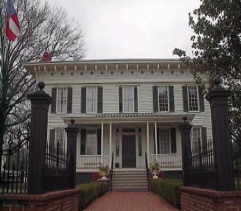
Civil War Heritage Trails
First Confederate
White House
Montgomery, Alabama
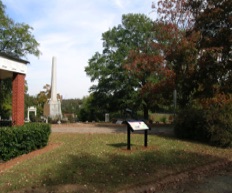
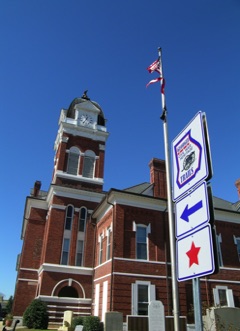
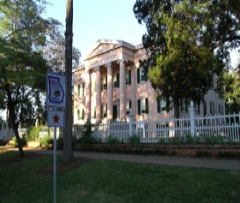
Old Governor’s Mansion
Milledgeville, Georgia
Georgia "trailblazer", directional arrow and
"red star" sign
Confederate Cemetery
Marietta, Georgia
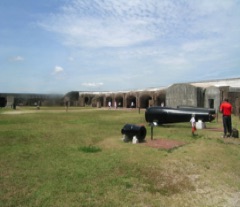
Fort Sumter
Charleston, South Carolina
Georgia "trailblazer", directional arrow and
"red star" sign

The Civil War, or War Between the States, changed America forever. More than 40,000 soldiers from Alabama, Georgia and South Carolina were killed between 1861 and 1865, while over 1.3 million slaves were emancipated by the War’s outcome. Its historic impact upon these three states was far greater than from any other war, hurricane or sporting spectacular.
Civil War Heritage Trails interprets this era along its historic routes, while leading visitors on an experience back in time. The drives themselves, along many of the same roads once traveled by soldiers wearing blue or gray, are as significant to understanding the importance of all three states as are the “interpretive markers.” Civil War Heritage Trails also highlights various preservation opportunities, with numerous scenic and cultural benefits.
Alabama, Georgia and South Carolina are divided into multiple trail “regions”, each focusing on a geographic area and/or major event from the Civil War era. The struggle for Atlanta and Sherman’s March were two of the War’s most decisive campaigns. Therefore the first “historic driving routes”, or “trails”, are being created through these respective regions of Georgia and South Carolina. Another is the route through South Carolina and Georgia that Confederate President Jefferson Davis rode in 1865 during his attempt to evade Federal capture. And another is the route through Alabama and into Georgia by the largest cavalry raid in North American history. Additional trails will interpret other historic aspects of the War in all three states.
Many additional topics are also interpreted along the route of each trail, including the roles of women, African-Americans, hospitals, churches, and railroads. Interpretive markers are “linked” along each route to national & state parks, museums and other heritage attractions. Visitors may obtain (as they become available) a full-color brochure of each trail, either by “downloading” their map at this website, or by requesting a complete brochure at many regional visitor centers.
The educational benefits of Civil War Heritage Trails are plentiful. Through a multi-level “History Committee”, with representatives from the National Park Service, State Park Services, colleges and universities, plus many local historians, the content of each interpretive marker is carefully reviewed. Documentation is required, and each marker includes a map, photos and/or Civil War era drawings, to help history “come alive.” And all markers are located near public parking. Such features are great for individuals, families, school field trips and group tours.
Civil War Heritage Trails is a 501c3 tax-exempt non-profit organization. Guided by a talented volunteer Board of Trustees, it is committed to the principle of local citizen involvement and decision-making. Each community has its own unique history. Civil War Heritage Trails coordinates the many participants, lending expertise to assist and manage the overall program.
Thanks to the involvement of hundreds of local communities, assisted by numerous private, state and federal entities, Civil War Heritage Trails has begun erecting thousands of colorful highway directional “trailblazer” signs, and hundreds of new interpretive markers, at historic locations stretching from the mountain valleys and cities to the sea, and from the Piedmont across the plains to the coast. We invite you to drive Civil War Heritage Trails, and to visit many of the places where important history was made. If you stop, look and listen, you might even hear a distant Rebel Yell, or glimpse Old Glory in the heat of battle. You will certainly learn why Alabama, Georgia and South Carolina were keys to the war that shaped America’s greatness!
Click Brochures
℠

